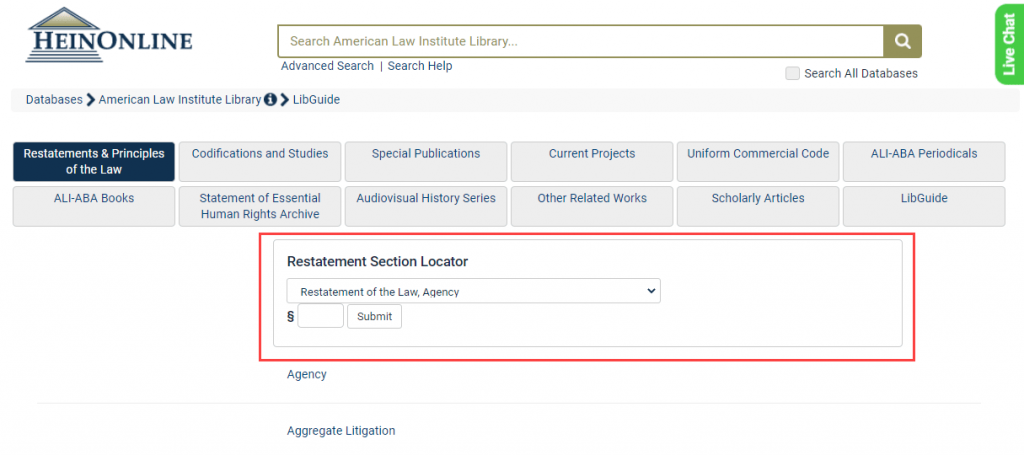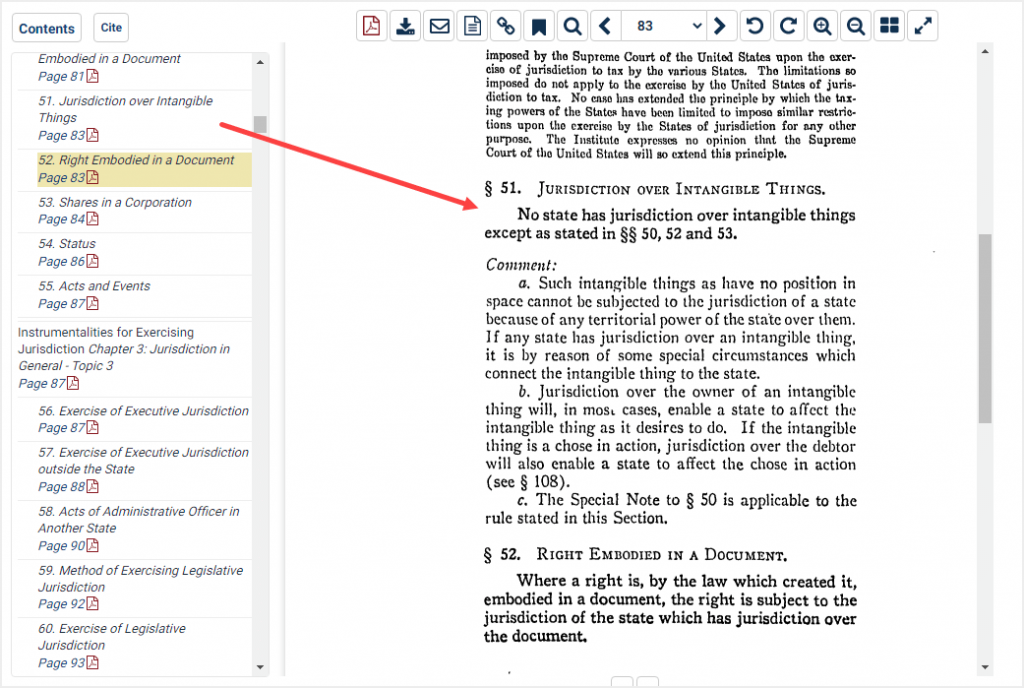HeinOnline offers a variety of a-la-carte databases to supplement user’s research in specific areas. The American Law Institute Library is a digital collection that provides easy access to invaluable American Law Institute projects and documents that have influenced modern law and society. Watch this short tutorial that includes a brief overview of the database and its tools, then continue to read the guide below.
Restatements of the Law
In American jurisprudence, the Restatements of the Law are a set of treatises on legal subjects that seek to inform judges and lawyers about general principles of common law and are one of the most respected and well-used sources of secondary authority. While courts are not obligated to adopt Restatement sections as the law, they often do because they typically restate the already-established law in other jurisdictions and demonstrate the current trend that other jurisdictions are following. HeinOnline contains current and historical restatements.

The Restatements subcollection includes tentative drafts and proposed final drafts. Once approved by the ALI Council and by the ALI membership at an Annual Meeting, these drafts represent the most current statement of ALI’s position on a subject and may be cited in opinions or briefs in accordance with Bluebook rule 12.9.4 until the official text is published.
The material in preliminary drafts and council drafts is subject to significant change during the project development process. Thus, these drafts are not included in this database until six months following the completion of a project, when they are made available by ALI for archival purposes only.
Restatement Section Locator Tool
The Restatement Section Locator Tool can be found on the American Law Institute Library homepage. This tool allows users to easily pull up a specific section of a Restatement. watch this short video or keep reading to learn more.
Use the drop-down menu to choose the Restatement category and enter the section number into the box provided.

Users are directed to the exact page the section appears on, or are provided with links to the section found in multiple sections of the Restatement volumes.

Other Featured Subcollections
While Restatements are typically the most sought-after documents in this database, it also contains additional significant content relating to the ALI. Let’s take a look at what else users can find in this database:
Codifications and Studies
Browse through various codes and studies conducted by the ALI. This subcollection contains the Model Penal Code, which played an important part in the widespread revision and codifications of the substantive criminal law of the United States. The purpose of the Model Penal Code is to stimulate and assist U.S. state legislatures in appraising the content of the penal law. In writing the Model Penal Code, the ALI examined the U.S. penal system and the prohibitions it lays down, the excuses it admits, the sanctions it employs, and the range of the authority that it distributes and confers.
Other significant titles include:
- Code of Criminal Procedure
- Federal Estate and Gift Taxation
- Study of the Division of Jurisdiction between States and Federal Courts
Special Publications
This subcollection contains key reports published by the ALI such as:
- Annual Reports: These reports contain information about the Institute’s organization, leadership, and current projects. They also include the Reports of the Institute’s Director and Treasurer. Annexes to the Reports provide information on published case citations to Restatements of the Law and to the ALI modifications and studies.
- ALI Reporter: This is the Institute’s quarterly newsletter, containing information about ALI projects, meetings, and members. Coverage dates back to inception in 1978.
- Miscellaneous publications: Various other publications include ALI’s 50th and 75th Anniversary volumes, The Preparation of ALI Drafts: Directions for Reporters, Report of the Special Committee on Future Program, Minutes in Remembrance from 1925-1997, and much more!
Current Projects
The Institute employs a careful, deliberative process in the drafting of its projects and the approval of drafts for publication. See what current projects are underway. HeinOnline contains published content and links to the ALI website for any projects that are fairly new, and therefore do not have published material available.
Uniform Commercial Code
The Uniform Commercial Code (UCC) is a comprehensive code addressing most aspects of commercial law and is generally viewed as one of the most important developments in American law. It has been enacted (with some local variations) in 49 states and in the District of Columbia and the Virgin Islands, as well as partially in Louisiana. HeinOnline includes UCC Drafts from 1944 through current, including the 1962 Official Text with Comments.
ALI-CLE Periodicals
ALI-ABA has been a leader in continuing professional education in the United States for more than 70 years. In 1947, the American Bar Association asked the American Law Institute to develop the first national program of post-admission legal education, which eventually lead to the creation of ALI-CLE.
ALI-ABA publishes several legal magazines to help keep professionals current in every area of the law. HeinOnline includes:
- ALI-ABA Estate Planning Course Materials Journal
- CLE Journal
- Practical Lawyer
- Practical Litigator
- Practical Tax Lawyer
- And more!
It also features the Trial Manual 6 for the Defense of Criminal Cases, a widely-used how-to-guide for handling criminal court cases.
Statement of Essential Human Rights Archive
A pioneering ALI project of the mid 1940’s, “Statement of Essential Human Rights” is the Institute’s contribution to post-war problems.
The ALI’s effort to create a “Statement of Essential Human Rights” was a consequence of the tumultuous times faced by all during World War II. Members of the Institute began to question what aftermath the involved nations, governments and citizens would encounter when Hitler and the Axis powers were ultimately defeated. Contributors to the Statement hoped to address three major issues with this document: the political structure of the post-war world, problems concerning the rebuilding of devastated economies and lastly, the recognition of the fundamental rights of individuals.
The Committee of Advisors tasked with creating and editing a draft of the Statement was unable to agree upon which human rights were indeed necessary and essential. Therefore, the Institute’s involvement with the Statement of Essential Human Rights ceased and it was never released to the Institute’s membership.
Additional subcollections include:
- The Audiovisual History Series
- Related books
- Scholarly articles
- External links to further your research outside of HeinOnline.